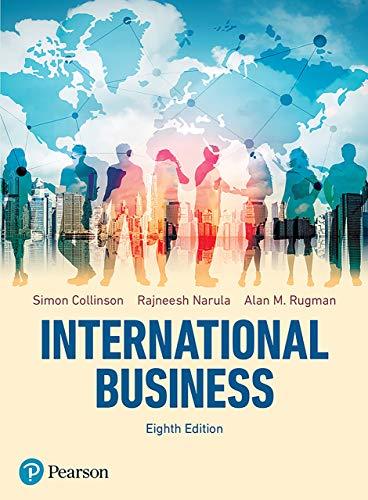With free trade areas evolving around the globe, many protected industries are now facing unwelcome competition. Free
Question:
With free trade areas evolving around the globe, many protected industries are now facing unwelcome competition. Free trade agreements generally include a principle of national treatment under which a country must treat all producers, domestic or foreign, equally. However, some seemingly neutral environmental regulations impose a greater burden on foreign producers than on their domestic competitors. Thus, they act as trade barriers under the disguise of environmental regulations.
For example, while environmental groups lobby for newsprint to contain a determined amount of recycled material and domestic producers of newsprint support the regulation, foreign newsprint companies, which have no recycling facilities in the host country, face a competitive disadvantage. This is what has been called a ‘Baptist–bootlegger’ coalition. During the US prohibition era, Baptists were opposed to alcoholic consumption on moral grounds, while bootleggers actually benefited from prohibition by the sale of illegal alcoholic beverages. Today, environmental groups and domestic producers often form coalitions to promote their respective interests.
In the newsprint case, the foreign company would have two options if it were to continue to supply material from its home country. It could either open recycling plants in the host country and transport pulp from its own country to be processed there, so as to meet the environmental regulations, or take the recycling material to its home country to be processed. Both alternatives would pose significant transportation costs to the foreign producer.
A similar case is presented by the Ontario Beer Can Tax. In the early 1990s the province of Ontario levied a tax of $0.10 on each aluminium beer can. The province argued that these cans were not environmentally friendly and that the tax was designed to encourage the use of refillable glass bottles. US producers of beer and aluminium cans contended that this was a protectionist move and that the Ontario government was singling out the competition with its beer industry since it had no similar tax for soft drinks and juice cans. Moreover, research studies found that aluminium cans and glass bottles both have the same effect on the environment, and that 80 per cent of all the cans were being recycled. They also found that the larger, heavier glass required more energy to transport than did the lighter aluminium cans.
More recently, the UK government received a report to impose a new tax on businesses that use virgin plastic packaging. Virgin packaging refers to fresh plastic that has not been manufactured into a product. Once manufactured, then the plastic product can be recycled. World Wide Fund for Nature (WWF) and the Resource Association commissioned environment group Eunomia to issue the report. The disposal of plastic has received new levels in the UK; this is because China recently banned the import of plastic waste. Given this, the UK has been chasing markets such as Malaysia, Vietnam and Thailand. However, these countries are now also imposing their own restrictions on plastics due to excessive stockpiling of waste. The majority of plastic waste from the UK has been going to Turkey and the nation continues to struggle to find other markets due to environmental restrictions.
Step by Step Answer:

International Business
ISBN: 9781292274157
8th Edition
Authors: Simon Collinson, Rajneesh Narula, Alan M. Rugman





